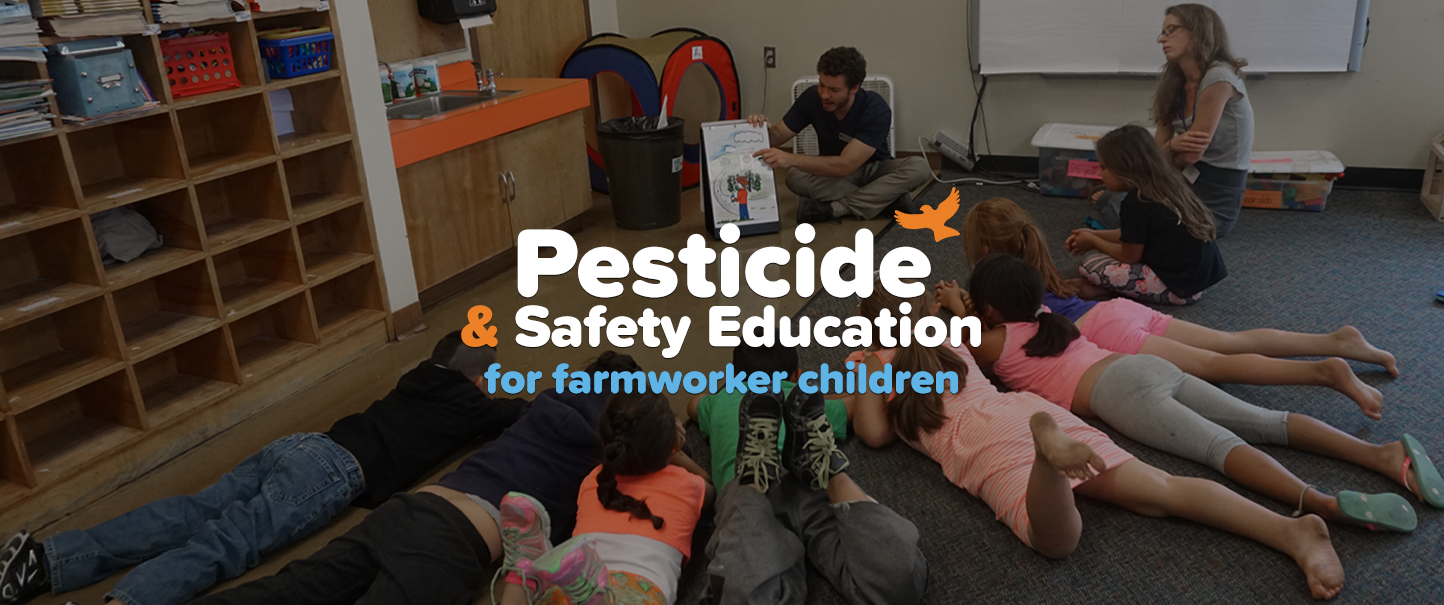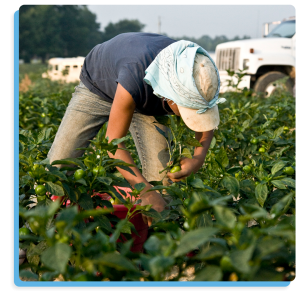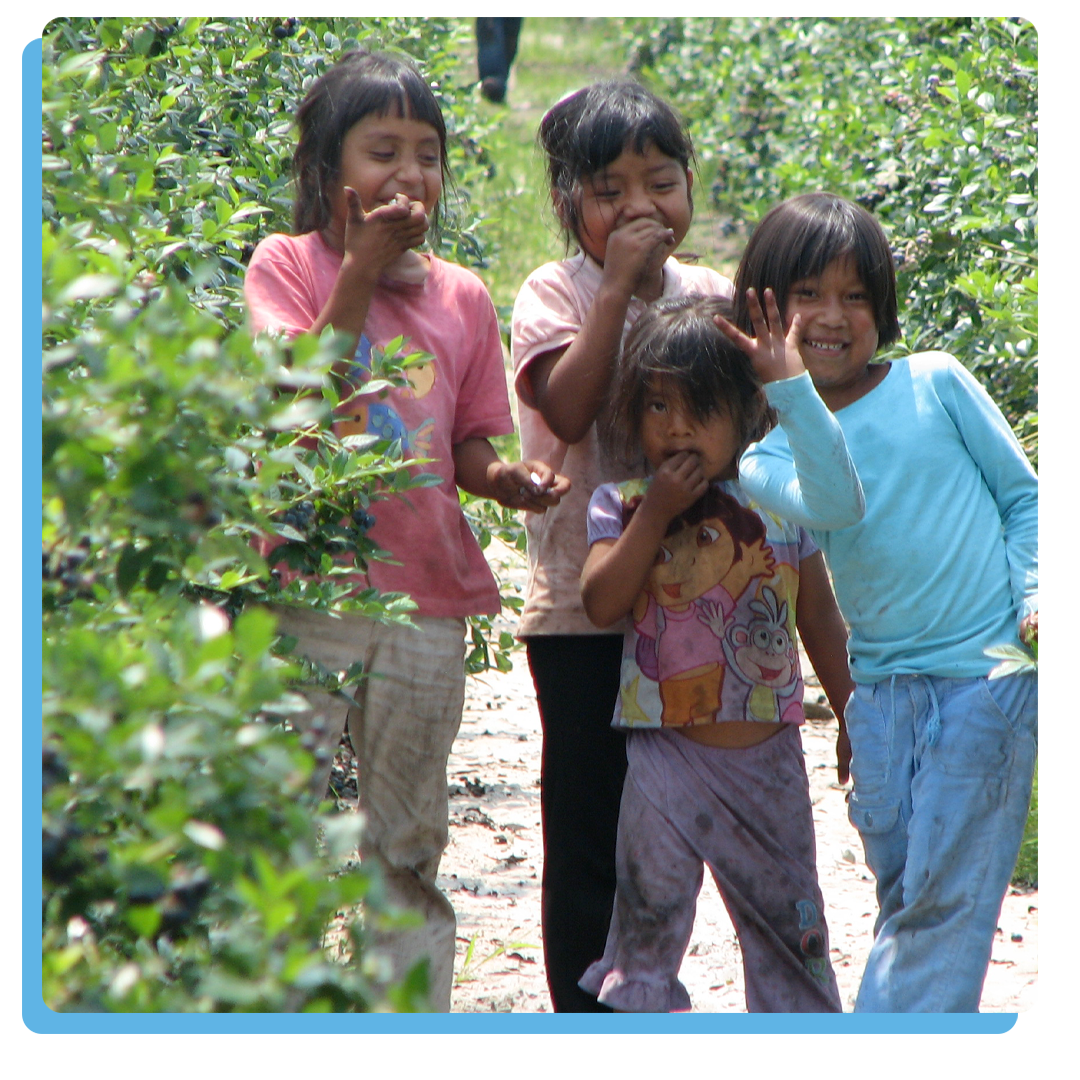Children are at greater health risk from pesticide exposure than adults. Pesticides have been linked to numerous health problems, including asthma, dermatitis, learning disabilities, leukemia, brain tumors and certain childhood cancers. Several factors contribute to this vulnerability. We may think of children as “little adults”, but in fact, their bodies are not fully prepared to handle toxic chemicals.
AFOP recognizes the importance of educating children on how to protect themselves from pesticides to avoid immediate or future health hazards. We have created an interactive and bilingual curriculum called José Aprende Sobre los Pesticidas (Jose Learns About Pesticides) that is about a boy called “José” whose family works in the fields. Among many lessons,children are taught about how to dress fro the fields, as well as the importance of washing their hands before eating or going to the bathroom while and after being in the fields.
CHILDREN ARE NOT MINI ADULTS
Their reproductive and immune systems are still developing. Many pesticides are designed to act as cholinesterase inhibitors. The enzyme is critical to proper functioning and development of the central nervous system. This means that the pesticide is designed to interrupt normal reproductive development.
These are the most common health effects among children linked to pesticide exposure:
Learn more…
about the devastating health effect of pesticide exposure among farmworker children.
PESTICIDE EXPOSURE & CHILDREN
Children are at greater health risk from pesticide exposure than adults.
Pesticides have been linked to numerous health problems, including asthma, dermatitis, learning disabilities, leukemia, brain tumors and certain childhood cancers.
Several factors contribute to this vulnerability. We may think of children as “little adults”, but in fact, their bodies are not fully prepared to handle toxic chemicals. Because their glands, pancreas, liver and kidneys are still developing, children’s metabolic and immune systems can not completely detoxify and eliminate toxins. Many pesticides are hormone blockers and others mimic hormones, which can have serious affects on children’s development, in those early years of rapid development, between birth and six years.
Absorption through the skin is the most common route of pesticide exposure among adults and children. The dermal area of an infant per unit of body weight is greater than that of an adult.
Pesticide residues in the home pose a greater threat to children living there. Also, children’s breathing zones are closer to the floor, which exposes them to higher concentrations of pesticides that tend to linger at floor level. Because children breathe more rapidly than adults, this situation creates exposure through inhalation.
Children’s normal play and social development can cause pesticide exposure as well. Behaviors such as crawling and playing on the floor put them at risk from pesticide residues. Children are also quick to put hands, toys and other things in their mouth. Objects that may have pesticide residues on them (some are not visible) can cause exposure via ingestion. Children’s natural curiosity too, leads them to explore kitchen cabinets and other areas where household chemicals may be stored. These risks to children’s health can be greatly reduced, if not eliminated, with certain precautions.
HOW ARE CHILDREN EXPOSED TO PESTICIDES?
HOW ARE CHILDREN EXPOSED TO PESTICIDES?
Children can be exposed to pesticides when their parents come home from the field and hug them after a long day of separation. Pesticide residues stick on their parent’s hair, skin, clothes, work boots, and lunch pails.
- Children’s breathing zones are also closer to the ground, exposing them to inhalation of pesticides that linger on the floor.
- Children have special vulnerability of health effects because of exposure through their behaviors.
- Crawling and playing on the floor put them at risk for residue absorption through their skin.
Children are quick to put hands, toys, and other objects in their mouth.
CHILDREN ARE NOT LITTLE ADULTS!
CHILDREN ARE NOT LITTLE ADULTS!
From birth through the teen years, all the major body systems go through “growth spurts.” During these critical periods of growth, exposure to toxic chemicals like pesticides can result in serious problems with health and development.
For years after birth, children’s bodily systems are still developing, so it is more difficult for their bodies to process and break down toxics. The central nervous system undergoes its period of most rapid development from the fetal stage through the first six years of life, so young children are especially vulnerable to pesticides that act as neurotoxins.
- Pound for pound, kids breathe more, drink more, and eat more than adults, so they take in more toxins like pesticides that pollute their air, water, and food. Children’s bodies metabolize, detoxify and eliminate substances differently than adults’ bodies do.
- The dermal area of an infant per unit of body weight is greater than that of an adult, allowing for greater vulnerability to dermal absorption.
- Children are at higher risk when exposed to pesticides due to a higher skin surface area to weight ratio, faster metabolisms, and ongoing development; in addition to their curious and exploratory behavior (American Journal of Public Health, April 2003).
- Babies and small children also take in toxins when playing close to the ground or putting things in their mouths.
PESTICIDES CAN HARM CHILDREN’S HEALTH
PESTICIDES CAN HARM CHILDREN’S HEALTH
- Pesticides can trigger asthma attacks and aggravate allergies and other respiratory problems.
- Pesticides may increase risk of infertility, stillbirth, mental and emotional problems, certain types of cancer, and birth defects.
- Children in areas where pesticide use is common have been shown to suffer from neurological problems such as poor hand-eye coordination, lack of stamina, and difficulty concentrating, compared to children from areas where pesticides are not used.
RELATED STUDIES
RELATED STUDIES:
Links were taken from the Internet, AFOP nor its affiliates, funders or membership were involved in the following studies.
- Pesticide Exposure May Contribute to ADHD
- Prenatal Pesticide Exposure Tied to lower IQ in Children
- UC Davis study links autism to pesticides
Yaqui Tribe Case Study Result:
This was a study done by an anthropologist who was looking at two groups of young children of the Yaqui Tribe in Mexico. The children live in an agricultural area but whereas in the foothills pesticides are rarely used, the valley is inundated by pesticides. A group of 5 year olds were asked to draw a stick figure of a person. You can see a dramatic difference between the motor abilities of the children growing up in the foothills as opposed to the valley.
WHAT IS JOSE LEARNS ABOUT PESTICIDES ABOUT?
AFOP recognizes the importance of pesticide safety prevention education at an early age to avoid immediate or future health hazards. That is why, we have developed and interactive and bilingual curriculum called José Aprende Sobre los Pesticidas (Jose Learns About Pesticides) about a boy named “José” whose family works in the fields. Among many lessons, José is taught how to dress in the fields, as well as the importance of washing his hands before eating or going to the bathroom



